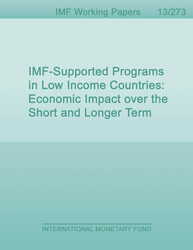
IMF-Supported Programs in Low Income Countries: Economic Impact over the Short and Longer Term
This paper studies the short and longer-term impact of IMF engagement in Low-Income Countries (LICs) over nearly three decades. In contrast to earlier studies, we focus on a sample composed exclusively of LICs and disentangle the different effects of IMF longer-term engagement and short-term financing using a propensity score matching approach to control for selection bias. Our results indicate that longer-term IMF support (at least five years of program engagement per decade) helped LICs sustain economic growth and boost resilience by building fiscal buffers. Interestingly, the size of IMF financing has no significant impact on economic growth, possibly pointing to the prominent role of IMF policy advice and institutional capacity building in the context of longer-term engagement. We also present evidence that the short-term IMF engagement through augmentations of existing programs or short-term and emergency facilities is positively associated with a wide range of macroeconomic outcomes. Notably, the IMF financial support has the greatest impact on short-term growth when LICs are faced with substantial macroeconomic imbalances or exogenous shocks.
Publication date: December 2013
ISBN: 9781484356203
$18.00
Add to Cart by clicking price of the language and format you'd like to purchase
Available Languages and Formats
| English |
Prices in red indicate formats that are not yet available but are forthcoming.
Topics covered in this book
This title contains information about the following subjects.
Click on a subject if you would like to see other titles with the same subjects.
Economics- Macroeconomics , Economics / General , International - Economics , IMF programs , macroeconomic outcomes , economic growth , propensity score matching , low-income countries
Summary
Copyright © 2010 - 2024
Powered by:
AIDC



